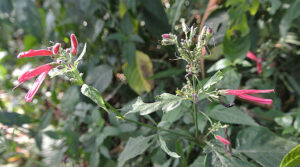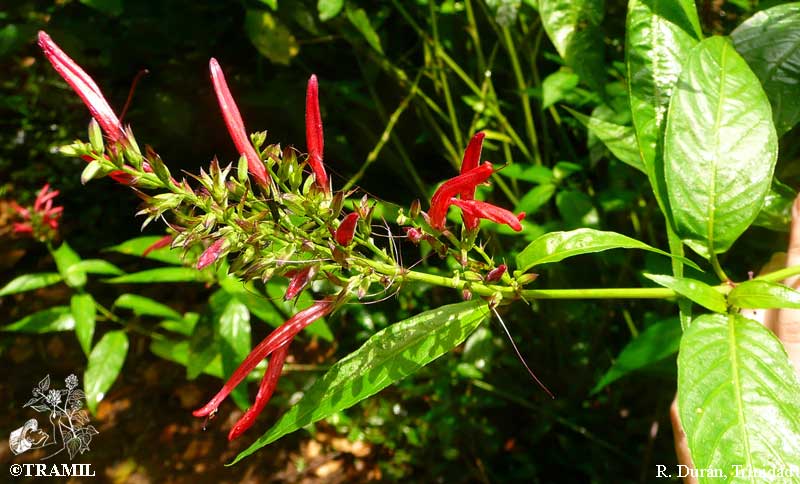Health Benefits of Justicia Secunda
Justicia secunda belongs to the family Acanthaceae and is known as ‘Blood root’ in Barbados and ‘Sanguinaria’ in Venezuela. Common uses of the plant include wound healing, anemia, and abdominal pain.
In southeastern Nigeria, Congo, and southern Cote d’Ivoire, Jehovah’s Witnesses believers consume a decoction of the leaves to treat anemia. Anti-sickling, blood, antibacterial, and antihypertensive effects of J. secunda have been reported.
About Justicia Secunda
Phytochemical screening of plants revealed the presence of tannins, flavonoids, alkaloids, quinines and anthocyanins. Luteolin, aurantamide acetate, auranamide, kindline and pyrrolidone derivatives; secundareron A, B, and C were isolated from J. secunda.
Despite J. secunda’s widespread use in folk medicine, little pharmacological research has been done on this plant. This study investigated the antioxidant, anti-inflammatory and antinociceptive effects of methanolic extracts of J. secunda (J. secunda) leaves.
Named after the 18th-century Scottish botanist James his Justice,the genus Justicia is a flowering plant in the family Acanthaceae. Justicia secunda is a medicinal plant that has been traditionally used as a blood tonic in Nigeria since ancient times.
The liquid obtained after boiling is usually purple. The local users of the leaves are mainly anemic patients, women who want to replenish their blood after the menstrual cycle, and pregnant women.
Commonly considered an ornamental plant, it is widely distributed throughout Africa. In Nigeria, it is grown around homesteads and used as fences.

Justicia secunda has been proven to have more effective blood-boosting properties than blood tonics by researchers using animal models in a new study.
As a result, blood levels can be effectively restored to normal in a short period of time. It is commonly referred to as “hospital is too far” or “the blood of Jesus”. It is known in Igbo as “Ogwu Obara”.
The Yoruba call it “ewe eje” (blood leaf) or “ewe ajeri” (Jehovah’s Witness leaf). Apparently it’s called “èwe ajeri” as a reminder that the journal is an alternative blood transfusion for Jehovah’s Witnesses.
As I prepared to discuss this plant, the fact that it is blood-red when cooked flashed the signature teaching in my mind.
Modern medicine rejects the signature doctrine, but scientific research tends to inadvertently verify signatures. All the studies on Justicia have proven that it has blood-enhancing properties! Can you believe that Cnidoscolus aconitifolius (efo iyana ipaja) is also called ‘the hospital is too far’ just like Justicia secunda?
According to Punch writer, “I asked Pastor Athirade Adelami about this plant because I saw it for the first time in his home.” He told me that the hospitalized patient was suffering from severe anemia and they cooked the leaves for him.
SEE ALSO: Benefits of Turkey Tail
When the patient’s blood levels were checked again, they were again elevated. He continues, he has used the plant on many people and reported good results.
The liquid obtained after boiling is usually purple. Most of the medicinal properties such as antimicrobial, antioxidant, hypocholesterolemic and anticancer properties exhibited by plant extracts are mainly related to bioactive components such as phenols and flavonoids.
Justicia Secunda leaf extract is rich in iron, riboflavin and vitamins A, C, E, B1, B2, B9 and B12. It is also reported to be rich in both macronutrients and trace elements, of which calcium and iron are present in large amounts.
Benefits of J. Secunda
It is used to treat fever, pain, diabetes, diarrhea, liver disease, rheumatism, and arthritis. It also has anti-inflammatory, antitumor, antiviral and analgesic effects.
Justicia species found in India, such as Justicia tranquebariensis and Justicia wynaadensis, have been reported to have cardioprotective properties and antioxidant activity.
Several Justicia species are used in traditional medicine in various parts of Africa to treat anemia, inflammation, fever, diarrhea, liver disease, arthritis, and respiratory and gastrointestinal disorders.
Before continuing with Justicia secunda, let me tell you a story. This is a story culled from Punch Newspapers. Years ago, Bukola, one of my brothers, her Mrs. Oradejo, gave birth to her first child and was pregnant with her second child before her menstruation returned.
I noticed after weaning her second child, she came to see me and complained that her periods had not returned. I told her to try nature. I started and as usual everything I used is in nature. A few days later she started having cramps and finally got her period!
Back to Justicia. In Nigeria, justicia secunda leaves are usually made into a soup with edible vegetables. It is boiled separately in water to make a tea, or prepared by being boiled together with other medicinal plants for therapeutic purposes. In some places it is used as a cooking vegetable together with Ocimum gratissimum (Efinrin) for decoration.
In a study entitled “Hematological and biochemical studies of Justicia secunda leaf extract in phenylhydrazine – induced anemia in albino rats” by Onye abo et al. Justicia secunda extract not only ameliorated the anemic status of phenylhydrazine-induced rats, but also improved their lipid profiles.
Therefore, the results of this study indicate that J. secunda leaves can be used to treat lipid abnormalities associated with anemia.
In another study by Ukpabi-Ugo et al entitled “Hepatoprotective effect of methanolic extract of Justicia secunda leaves on carbon tetrachloride poisoning albino rats”. The results of this study indicate that Justicia secunda methanol extract has hepatoprotective properties and may be effective in treating hepatotoxicity.
The ameliorative effect of Justicia secunda on blood glucose and lipid profiles in alloxan-induced diabetic albino rats was evaluated in a study entitled “Effect of methanol leaf extract of Justicia secunda on blood glucose and lipid profiles in alloxan-induced diabetic albino rats”.
It was rated by Ukpabi-Ugo et al. The results of the study showed that Justicia secunda methanol leaf extract exhibited dose-dependent antidiabetic activity against alloxan-induced diabetes in albino rats. This suggests that Justicia secunda leaves can be used to treat diabetes mellitus and condition is prevented.
Alozie, “Modulating activity of Justicia secunda in Plasmodium-infected mice,” This study demonstrates the antimalarial potential of aqueous extracts of Justicia secunda leaves and confirms their continued use in folk medicine.
This beneficial effect can be exploited in combination therapy with other antimalarial drugs to achieve complete elimination of the malaria parasite by isolating and characterizing the bioactive molecules present in the plants under study.
In a study titled “In silico evaluation of Justicia secunda bioactive compounds as anti-obesity, antioxidants and potential inhibitors of enzymes involved in obesity”, Insights from Kinetics, Semi-Empirical Quantum Mechanics, and Molecular Docking Analysis,” Akpovwehwee et al. It has been shown to be a rich natural source of medicine.
In addition to promoting blood circulation, it has anti-obesity, hypoglycemic, antimalarial, and liver protective effects. It does even more! Justicia secunda is a must in your garden.
The leaves of Justicia pectoralis Jacq. (Acanthaceae) are now found in northeastern Brazil and are widely used to treat diabetes, menstrual cramps, asthma, and other conditions. This work aimed to identify the phytochemical properties and biological activities of J. pectoralis leaf extracts.
Traditionally, some Justicia species are used to treat inflammation, gastrointestinal disorders, respiratory infections, fever, pain, diabetes, diarrhea, liver disease, rheumatism, and arthritis. It also has anti-inflammatory, antitumor, antiviral and analgesic effects.
Justicia secunda, recognized as a traditional medicinal plant, boasts a myriad of benefits attributed to its diverse array of compounds. Within its extracts, one can find flavonoids, phenolic acids, alkaloids, vitamins, minerals, and phytochemicals, collectively contributing to its bioactive properties.
The multifaceted nature of these extracts has unveiled their potential in various health-related applications.
Studies indicate that the extracts from Justicia secunda possess antioxidant properties, enzyme inhibitory effects, cytotoxicity, and antiviral capabilities.
These attributes make them promising candidates for managing diseases associated with oxidative stress, including cancer, diabetes, and Alzheimer’s disease. The antioxidative nature of the plant’s compounds suggests a potential role in mitigating cellular damage and addressing conditions linked to oxidative imbalance.
Beyond oxidative stress-related conditions, Justicia secunda extracts have exhibited noteworthy impacts on reproductive health. Research has indicated an enhancement in reproductive parameters, including an increase in follicle-stimulating hormone (FSH) and estrogen levels.
Such effects are believed to be influenced by the presence of steroids within the plant, highlighting its potential role in supporting reproductive well-being.
Moreover, the antimicrobial activity demonstrated by Justicia secunda extracts against various pathogens underscores their potential as a valuable source of antimicrobial agents. This aspect adds another layer to the plant’s versatility, suggesting applications in combating microbial infections and promoting overall immune health.
In summary, Justicia secunda emerges as a multifunctional bioactive raw material with promising implications in diverse health-related domains. Its antioxidant, reproductive health-supportive, and antimicrobial properties position it as a subject of interest for further research and potential therapeutic applications.
More Insights on Justicia Secunda
Benefits of Eating Strawberries
Benefits of Eating Pomegranate

A graduate of Computer Science and Information Management Technology. Diploma – Caregiving, Certificates – Dementia and Diabetes Awareness and Management. A researcher, blogger, songwriter, singer and acoustic guitarist. Born in an environment where natural talents such as healing are imparted at our natural birth. This natural talents of healing is the result of our genetic inheritance and the training from family environment.











